In Singapore, establishing an auction company specializing in antiques, jade, and high-end jewelry is not only an opportunity where culture and wealth converge but also a comprehensive challenge spanning legal, tax, and professional operational aspects.
Today, we will provide you with a practical guide to operating an auction company in Singapore, covering aspects such as registration, licensing, and operations.

I. The Landscape and Opportunities of Singapore’s Auction Industry
1. The Rise of High-End Auctions in Singapore and Their Market Potential
Over the past decade, Singapore has evolved from a regional business hub into a vital platform for wealth and cultural exchange between Asia and the global community. With economic development and the upgrading of cultural consumption, the demand for transactions involving high-value collectibles such as jade, antiques, and luxury jewelry has significantly increased.
Especially against the backdrop of the growing international influence of Chinese culture and the maturation of local collecting communities in Southeast Asia, the high-end auction market has become a “blue ocean” attracting investor attention. The characteristics of this market include high-value individual auction items, a small yet discerning buyer base, and transactions often relying on trust and brand influence.
Singapore’s advantage lies in its transparent, fair, and internationally recognized legal system, which ensures the security and traceability of auction transactions. Additionally, Singapore is one of the world’s most convenient cross-border trade hubs, with air and sea transportation capable of quickly reaching major global markets, creating conditions for attracting international buyers to auctions.
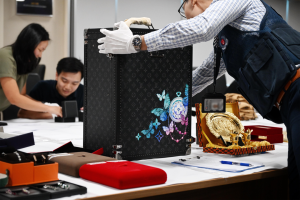
Source: Lianhe Zaobao
2. Policy and institutional advantages drive the thriving development of the auction industry
Singapore’s auction industry is regulated by multiple legal frameworks, ensuring market order while providing businesses with clear development pathways.
Registration convenience: To register a company with the Accounting and Corporate Regulatory Authority (ACRA), one only needs to prepare the company name, director and shareholder information, and a local registered address. The process can be completed online, with a business license typically issued within one to two days.
Clear Regulation: If business operations involve precious gemstones, gold jewelry, jade, etc., registration as a Regulated Dealer under the Precious Stones and Precious Metals Prevention of Money Laundering and Counter-Terrorism Financing Act (PSPM Act) is required. Applications can be submitted through the GoBusiness platform.
Tax Transparency: Singapore’s tax system is simple and straightforward, with a flat corporate income tax rate of 17%. When a company’s turnover exceeds S$1 million, it must register for Goods and Services Tax (GST) at a rate of 9%. Exported auction items may also qualify for a zero-rate policy, reducing transaction costs for international buyers.

Source: Lianhe Zaobao
3. Core Competitive Advantages of Singapore’s Auction Industry
High International Trustworthiness: Singapore consistently ranks among the top countries globally in terms of transparency and business environment rankings, and this international reputation greatly enhances the confidence of overseas buyers.
Precise Customer Base: The target customers of auctions are primarily high-net-worth individuals who prioritize rarity and artistic value over price when making purchases.
Clear Policy Support: The government encourages activities related to art, culture, and high-end commerce, with transparent approval processes and predictable timelines.
High Service Value-Added: Professional auction companies not only sell auction items but also provide comprehensive services throughout the entire process, including valuation, insurance, storage, cross-border transportation, and tax planning, forming a high-value-added integrated business model.
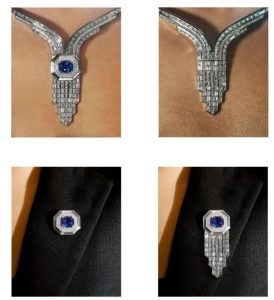
Source: Lianhe Zaobao

II. The Complete Process from Registration to Operations
1. Company Registration and Business Positioning: The First Step Is Crucial
The first step for an auction house is to register with ACRA. It is generally recommended to establish a “Private Limited Company,” which can enjoy tax incentives while enhancing the company’s image. During registration, the following are required:
Determine and obtain approval for the company name;
At least one local director;
Appoint a company secretary;
Provide a local registered address in Singapore;
Select appropriate business codes (e.g., precious stones, auctioneering services).
Business positioning must be clearly defined at registration, such as focusing on jade and high-end jewelry or covering broader categories like antique furniture and artworks, as this will impact subsequent license types and customer demographics.
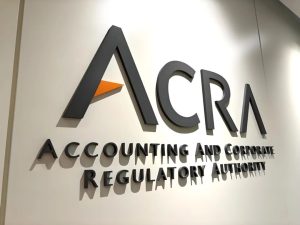
Source: Lianhe Zaobao
2. Apply to become a Regulated Dealer
If auction items include precious stones, gold jewelry, jade, etc., you must apply for dealer registration on the GoBusiness platform:
Complete the online application form and submit company information, business type, and compliance procedures;
Pay the application fee of S$120;
Wait approximately four weeks for approval;
Select Class A (limited amount) or Class B (unlimited amount) based on your business type;
Pay the annual fee and obtain the registration certificate issued by the Singapore Ministry of Law (MinLaw);
Renew annually on time.
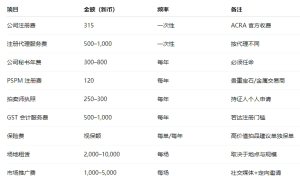
Image/Registration and Operational Costs Summary Table (Partial)
3. Auctioneer License: A Necessary Condition for Legally Conducting Auctions
Whether conducting auctions in person or online, the host (Auctioneer) must hold a license.
The Auctioneers Licensing Act stipulates that auctioneers must hold a license to conduct any form of auction activity, and the license must be displayed in a prominent location at the auction site.
License Application and Renewal Process:
Apply to the police or designated department;
Submit identification documents and business background information;
Pay the applicable fees;
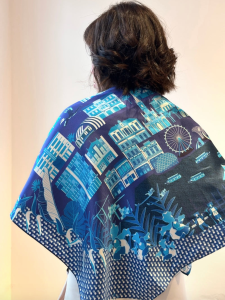
Image Source: Lianhe Zaobao
① Application Requirements:
Be at least 21 years of age;
Have no criminal record;
Be familiar with auction-related regulations.
② Application Process and Fees:
Submit the application form to the Licensing Division of the police;
Provide identification documents and company background documents;
Pay an annual fee of approximately S$250–S$300;
Note: The license is valid until December 31 of each year and must be renewed 10 days before expiration.
Real-life example: A jewelry auction company neglected to apply for an auctioneer’s license during its early stages of operation. Its first auction was shut down by law enforcement authorities and fined S$5,000, directly resulting in customer loss. Therefore, the license application must be completed before the first auction.

Image source: Lianhe Zaobao
4. GST Registration and Cross-Border Tax Compliance
When annual turnover exceeds SGD 1 million, the company must register for GST within 30 days.
Domestic sales: Taxed at a 9% rate and reported;
Export sales: Eligible for a zero-rate tax, but export proof must be provided;
Special circumstances: Certain transactions involving cultural relics and artworks may qualify for tax exemptions under specific conditions.

Source: Lianhe Zaobao
5. Practical Reference for the Entire Auction Process
Collection and review of auction items: Ensure that the origin of the auction items is legal and there are no property disputes;
Valuation and reserve price setting: Based on market conditions, the rarity of the auction items, and customer demand;
Buyer registration and deposit collection: To prevent malicious bidding;
Auction terms and conditions: Covering the transaction price, premium ratio, transportation and insurance, and risk statements;
Auction execution: Choose between in-person, online, or hybrid formats;
Sale and delivery: Includes payment collection, invoice issuance, logistics arrangement, and insurance;
Post-sale and customer maintenance: Establish long-term partnerships.
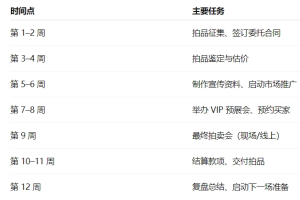
Image/Auction Timeline Planning

III. Operational Risks and Practical Recommendations
1. Compliance Risk Prevention
License deficiency risk: Conducting auctions without registering as a regulated dealer or without holding an auctioneer’s license may result in hefty fines or even criminal liability;
Tax non-compliance risk: Delayed registration for GST or inaccurate reporting may trigger tax adjustments and penalties;
Cross-border compliance risk: Some auction items require cultural relic export permits or endangered species trade permits (CITES); failure to obtain these may result in seizure or fines.
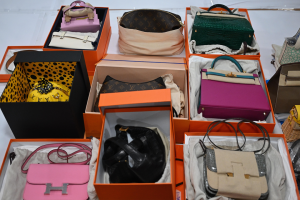
Source: Lianhe Zaobao
2. Business and Operational Recommendations
High-value auction items should be fully insured to mitigate the risk of accidental loss;
Contract terms should be reviewed by a lawyer, particularly reserve prices, premiums, and dispute resolution mechanisms;
When promoting in international markets, emphasize Singapore’s legal and reputational advantages;
Maintaining the trust of high-net-worth clients is more important than short-term profits.

Source: Lianhe Zaobao
Conclusion: Seize Opportunities and Establish a Global Presence
Singapore’s high-end auction industry is in an upward phase, with legal and policy frameworks providing businesses with a clear growth path.
By strictly adhering to registration, licensing, and tax regulations, combined with professional market operations and brand building, businesses can not only establish a foothold in the local market but also leverage Singapore’s international standing to attract buyers and sellers from around the world.
This is a long-term endeavor blending culture and commerce. Only by prioritizing compliance and professionalism can one remain invincible on the auction stage.
Note: Reference materials sourced from Singapore’s ACRA, GoBusiness, IRAS, Lianhe Zaobao, etc., compiled from public news reports. Reproduction must credit the source; contact for removal if infringing…….
